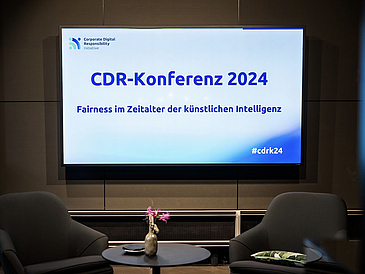Diginomics colleagues, Anna Christ and Christopher Johnson, recently attended two separate stakeholder events related to Corporate Digital Responsibility, which is the focus of their respective theses. The first event was “Digital Ethics 2.0 Navigating Ethics in the Age of Generative AI”, hosted by the Merck Group in Darmstadt. The second event was the “CDR Conference 2024 - Fairness in the Age of Artificial Intelligence” hosted by the Federal Ministry for Environment, Nature Conservation and Nuclear Safety (BMUV) in Berlin. This short report summarizes their experiences and the insights gained, highlighting the importance of CDR and related approaches to digital ethics to the Diginomics group and beyond.
Digital Ethics 2.0 Navigating Ethics in the Age of Generative AI, Darmstadt, Germany (summarized by Chris)
The hosts did a fantastic job creating an environment conductive to the exchange of ideas and best practices between academic and industry partners and all this took place at the Merck Innovation Centre, a state-of-the-art technology and science hub situation on their main campus. We explored the challenges of digital ethics in today's rapidly evolving technological landscape through a varied programme including an engaging address by philosopher Carissa Véliz from the University of Oxford. I really enjoyed her multi-layered keynote, first zooming out to explore what ethics means and how we put it into practice before focussing on the specific characteristics of digital technology and why they warrant our special attention when developing applied ethical approaches. The day also included three expert interviews and Q&A sessions allowing participants to learn more about digital ethics in practice. Break-away sessions in the afternoon offered a deep-dive into themes such as leveraging LLMs ethically for innovation in healthcare, trustworthy AI and AI ethics assessments in HR, and many more. I came away with a heightened appreciation of the diverse logical methods people and organisations use in ethical decision-making. In our approaches we must remain dynamic and work with, not against, the complexities of evolving digital ecosystems in order to meet the high expectations of stakeholders and wider society.
CDR Conference 2024 - Fairness in the Age of Artificial Intelligence (summarised by Anna)
Digital technologies are fundamentally changing business, creating heightened efficiency and productivity, however, not without impacting the environment and society. A growing discussion on corporate digital responsibility (CDR) emerged, addressing the raised concerns and identifying opportunities. CDR entails that an organization has incorporated its approach to digital responsibility into its values, which are formulated into principles and translated into action items to govern its achievability in daily corporate practice. The research into CDR brings valuable insights to the Diginomics Group since it addresses responsible digital topics on a cross-level, which is relevant to most of the other digital research fields in the group. With CDR focusing on discussing the company's role in facilitating responsible digital transformation, interface topics such as cooperation with other internal stakeholders and digital technologies are incorporated. As a practice-driven and politically charged topic, CDR necessitates continuous expert dialogue. The most recent such exchange took place in November at the fifth CDR Conference, hosted by the BMUV in Berlin. The hosting ministry spearheaded the creation of a CDR Code a few years ago, to which pioneering CDR companies have since committed. Their latest initiative is a “diversity impact assessment,” developed collaboratively with researchers and practitioners. The conference provided an opportunity to engage with experts shaping the political agenda and to stay updated on the latest practical advancements.



![[Translate to English:]](/fileadmin/_processed_/2/9/csm_chris_anna_merck_fc1e76af22.jpg)
![[Translate to English:]](/fileadmin/_processed_/f/b/csm_cdr_chris_and_anna_45087f29bd.jpg)
![[Translate to English:]](/fileadmin/_processed_/a/7/csm_CDR_d5b773bc9b.jpg)